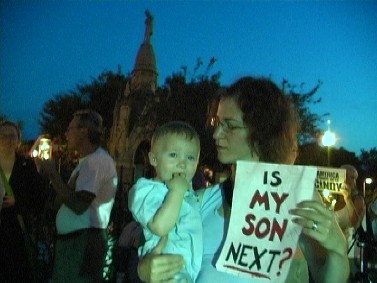Washington Post: Storm Exposed Disarray at the Top
Storm Exposed Disarray at the Top
By Susan B. Glasser and Josh White
Washington Post Staff Writers
Sunday, September 4, 2005; Page A01
The killer hurricane and flood that devastated the Gulf Coast last week exposed fatal weaknesses in a federal disaster response system retooled after the terrorist attacks of Sept. 11, 2001, to handle just such a cataclysmic event.
Despite four years and tens of billions of dollars spent preparing for the worst, the federal government was not ready when it came at daybreak on Monday, according to interviews with more than a dozen current and former senior officials and outside experts.
Among the flaws they cited: Failure to take the storm seriously before it hit and trigger the government's highest level of response. Rebuffed offers of aid from the military, states and cities. An unfinished new plan meant to guide disaster response. And a slow bureaucracy that waited until late Tuesday to declare the catastrophe "an incident of national significance," the new federal term meant to set off the broadest possible relief effort.
Born out of the confused and uncertain response to 9/11, the massive new Department of Homeland Security was charged with being ready the next time, whether the disaster was wrought by nature or terrorists. The department commanded huge resources as it prepared for deadly scenarios from an airborne anthrax attack to a biological attack with plague to a chlorine-tank explosion.
But Homeland Security Secretary Michael Chertoff said yesterday that his department had failed to find an adequate model for addressing the "ultra-catastrophe" that resulted when Hurricane Katrina's floodwater breached New Orleans's levees and drowned the city, "as if an atomic bomb had been dropped."
If Hurricane Katrina represented a real-life rehearsal of sorts, the response suggested to many that the nation is not ready to handle a terrorist attack of similar dimensions. "This is what the department was supposed to be all about," said Clark Kent Ervin, DHS's former inspector general. "Instead, it obviously raises very serious, troubling questions about whether the government would be prepared if this were a terrorist attack. It's a devastating indictment of this department's performance four years after 9/11."
"We've had our first test, and we've failed miserably," said former representative Timothy J. Roemer (D-Ind.), a member of the commission that investigated the Sept. 11 attacks. "We have spent billions of dollars in revenues to try to make our country safe, and we have not made nearly enough progress." With Katrina, he noted that "we had some time to prepare. When it's a nuclear, chemical or biological attack," there will be no warning.

 Song for Cindy Sheehan Video
Song for Cindy Sheehan Video




































 Madeleine BAROUKHEL-MOUREAU
Madeleine BAROUKHEL-MOUREAU 




























0 Comments:
Post a Comment
<< Home